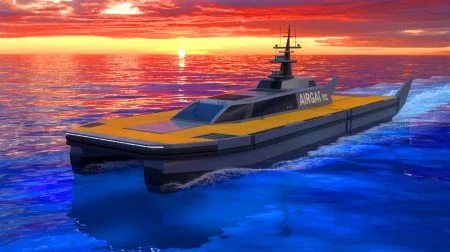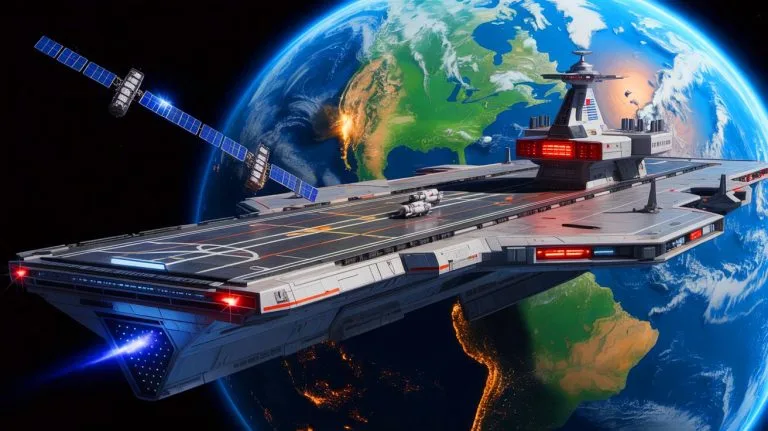| IN A NUTSHELL |
|
The United States is making significant strides in space technology through an ambitious project that aims to transform satellite deployment. The cornerstone of this initiative is the creation of an orbital aircraft carrier by the innovative startup Gravitics. This development underscores the U.S.’s strategic commitment to maintaining space as a pivotal domain and highlights the growing collaboration between private companies and national defense agencies. As global tensions rise, the United States is taking decisive steps to ensure its dominance and secure its presence in the increasingly competitive space sector.
The Vision Behind the Orbital Aircraft Carrier
In collaboration with the U.S. Space Force, Gravitics is leading a bold $60 million project to develop an orbital aircraft carrier aimed at revolutionizing satellite deployment. This cutting-edge platform will enable the direct launch of satellites from Earth’s orbit, offering a quicker and more flexible response to national security challenges. By eliminating the need for traditional rocket launches, this approach provides a significant strategic advantage for military operations.
The orbital carrier initiative aligns with the U.S. military’s goal of maintaining a strong orbital presence amid the potential for a space arms race. With a pre-positioned platform in orbit, the United States can deploy satellites as needed, addressing both immediate and long-term security issues. This advancement in space technology reaffirms the United States’ dedication to leading in this critical domain, positioning itself at the forefront of global space capabilities.
Enhancing Space Security and Superiority
Gravitics’s orbital aircraft carrier is designed to house multiple satellites in an unpressurized environment, safeguarding them from the severe conditions of space. This protection of sensitive electronics and batteries is vital in an era characterized by electronic warfare and cyber threats. By isolating and shielding satellites, the United States gains a strategic advantage in enhancing its space security capabilities.
Moreover, the carrier’s ability to conceal satellites from adversaries provides a tactical edge.
Gravitics CEO Colin Doughan describes the carrier as a “game-changer” that aligns perfectly with the Space Force’s mission of achieving orbital dominance.
This project not only strengthens military capabilities but also sets a precedent for future technological advancements in space exploration.
Public-Private Partnerships and Their Impact
The development of the orbital aircraft carrier exemplifies the increasing importance of public-private partnerships in the space industry. Gravitics, along with Axiom Space, is also developing a pressurized space module, demonstrating its commitment to both national defense and commercial solutions. This dual approach underscores Gravitics’s alignment with the Department of Defense’s objectives and its growth trajectory.
Collaborations between private companies and government entities are essential for integrating innovative technologies into national defense strategies. By working together, these partnerships strengthen the U.S.’s position in space while fostering the development of technologies with potential civilian applications. The success of these collaborations could open new market opportunities and further advancements in space technology.
The Future of Space Exploration
With the advent of technologies like the orbital aircraft carrier, a new era of space exploration and utilization is on the horizon. This technological breakthrough has the potential to transform security, surveillance, and communication paradigms, impacting both military operations and private sector involvement. The implications are vast, signaling a shift in how space is utilized and governed.
As the U.S. Space Force and companies like Gravitics prepare for future challenges, questions about international space cooperation arise. How will these innovations affect diplomatic relations between nations? More importantly, how can we ensure that space remains a domain of shared peace and progress, benefiting all of humanity?
Did you like it? 4.7/5 (29)





Wow, an orbital aircraft carrier sounds straight out of a sci-fi movie! 🚀
Wow, this sounds like something out of a sci-fi movie! 🚀
Isn’t $60 million a bit low for something so ambitious? 🤔
Will this project lead to more space debris, or do they have a plan to manage it?
What an incredible step forward for space exploration! Thank you for the informative article. 🌌
How will this affect international space treaties? 🤔
Are there any plans for civilian applications, or is this strictly military?
How do they plan to protect the satellites from space debris?
Love the idea, but $60 million seems like a lot. Is it really worth it?
This feels like the beginning of Star Wars. Hope we don’t meet Darth Vader anytime soon! 😅
Great article, thanks for sharing! 😊
Why hasn’t any other country thought of this? Or have they? 🤨
Are there any environmental concerns associated with this project?
Can’t wait to see how this changes satellite deployment. So exciting!
Is there any collaboration with other countries, or is this a solo US venture?
How long before we see this orbital carrier in action?
Sounds ambitious! What are the potential risks involved? 😬
I hope they have a backup plan if things don’t go as expected.
Will this lead to more jobs in the space industry?
Seems like a game-changer for sure! 🛰️
Is this technology going to be shared with NASA?
Not sure if I’m comfortable with more military tech in space.
Could this technology be used for civilian purposes as well?
Does Gravitics have any previous experience with space projects?
How will this impact global satellite communication networks? 🌐
The concept sounds cool, but is it feasible?
Is there a timeline for when this project will be completed?
Interesting read! What does this mean for the future of space travel?
This could change the balance of power in space. Is that a good thing?
Hope they address the cybersecurity risks mentioned. 🔒
Could this platform be used for launching other types of payloads?
Gravitics seems like a promising company. Who are their main competitors?
Is this related to Elon Musk’s projects in any way?
Will this affect the cost of satellite deployments?
How does this project align with international space law?
Fingers crossed for a successful launch! 🌌